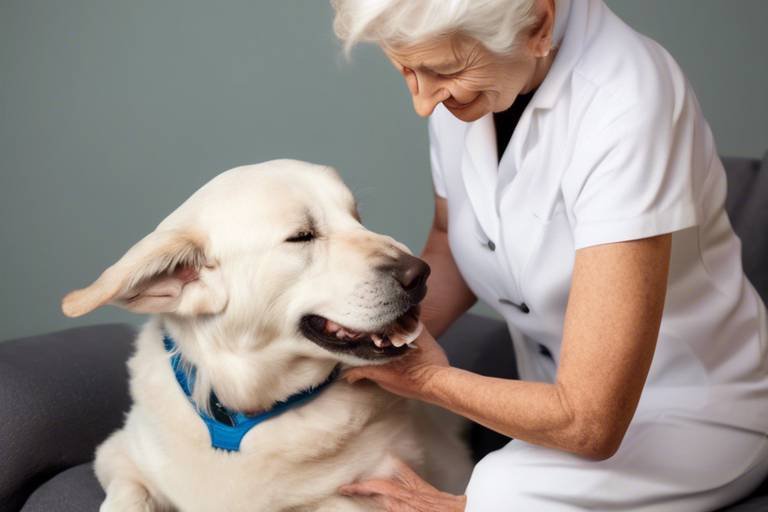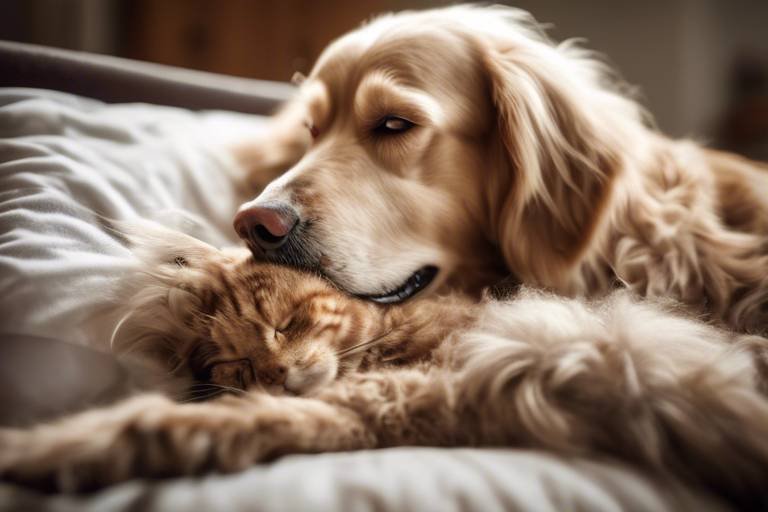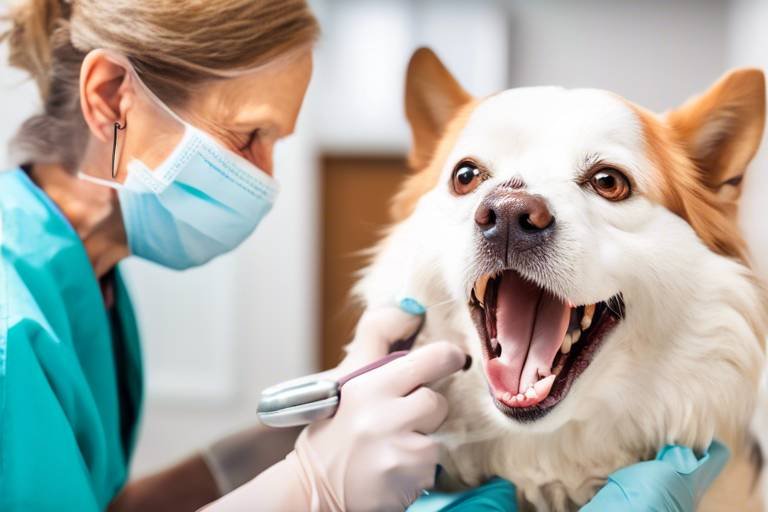Cognitive Decline in Senior Pets - What to Look For
Cognitive decline in senior pets is a critical issue that many pet owners may overlook. Just like humans, our furry friends can experience changes in their mental faculties as they age. This decline can be subtle at first, often mistaken for normal aging behaviors. However, recognizing the signs early on is essential for ensuring that your beloved companion maintains a good quality of life. So, how can you tell if your pet is experiencing cognitive decline? In this article, we will explore the signs, causes, and management strategies for cognitive decline in senior pets, helping you provide the best care possible for your four-legged family members.
Cognitive decline in pets refers to a gradual deterioration in mental functions, which can impact their ability to think, learn, and remember. Much like humans, pets can experience a decrease in cognitive capabilities as they age. It's crucial for pet owners to understand the signs and stages of this condition to provide timely care and support. Think of it as a slow fading of the vibrant colors in a beautiful painting; if you catch it early, you can help restore some of that brightness and improve your pet's quality of life.
Recognizing the symptoms of cognitive decline is essential for early intervention. Common signs include:
- Disorientation: Pets may seem lost in familiar environments, struggling to navigate their surroundings.
- Changes in sleep patterns: You might notice your pet sleeping more during the day or being restless at night.
- Altered interactions: Pets may become less responsive to commands or withdraw from family activities.
Each of these symptoms can indicate a decline in cognitive health, and understanding them can help you take action sooner rather than later.
One of the most concerning signs of cognitive decline is disorientation. You may notice your pet wandering aimlessly in familiar spaces, appearing confused about where they are. This confusion can lead to increased anxiety and stress for your pet. Imagine how disorienting it would be to suddenly forget where your favorite resting spot is! To help alleviate this, it's important for owners to create a safe and comforting environment for their pets. Keeping their favorite toys and bedding in familiar places can help ease their confusion.
Behavioral changes can also signal cognitive decline. You might observe your pet becoming more vocal than usual, or conversely, withdrawing from social interactions they once enjoyed. These shifts can be distressing, both for the pet and the owner. Just as we might feel off when we’re not ourselves, pets can express their discomfort through behavior. Understanding these changes allows owners to respond appropriately, providing the necessary support and reassurance their pets need during this challenging time.
Another common symptom of cognitive decline is altered sleep patterns. Many senior pets experience restlessness at night or excessive daytime sleeping. This can disrupt their natural rhythms and lead to further confusion and anxiety. Recognizing these changes can help owners adjust routines to promote better sleep quality. Think of it like adjusting your own bedtime routine when you’re feeling out of sorts; a little change can make a world of difference!
Cognitive decline can significantly affect a pet's daily activities, including eating, playing, and interacting with family. It’s heartbreaking to see a once-active and engaged pet become less involved in family life. Owners should be aware of these impacts to ensure their pets maintain a good quality of life. Regularly engaging your pet in gentle activities and providing mental stimulation can help counteract some of the effects of cognitive decline.
Several factors contribute to cognitive decline in senior pets, including age-related changes, neurological conditions, and environmental influences. Understanding these causes can help owners take preventive measures and seek appropriate care. Just like knowing the ingredients in a recipe can help you cook better, knowing the causes can empower you to take action for your pet's health.
As pets age, their brains undergo changes that can affect cognitive function. Recognizing the natural aging process can help owners differentiate between normal aging and signs of cognitive decline. It’s essential to remember that some changes are expected, but significant shifts should not be ignored.
Underlying health issues, such as hormonal imbalances or neurological disorders, can exacerbate cognitive decline. Regular veterinary check-ups are essential for identifying and managing these conditions effectively. Just like a car needs regular maintenance to run smoothly, your pet needs routine care to stay healthy!
Effective management of cognitive decline involves a combination of environmental enrichment, dietary adjustments, and medical interventions. Owners can implement various strategies to enhance their pets' quality of life and cognitive function. Think of it as a toolkit for your pet’s brain health!
Engaging pets in mentally stimulating activities, such as puzzle toys and interactive games, can help slow cognitive decline. Incorporating these activities into daily routines fosters mental engagement and emotional well-being. Just like humans benefit from learning new skills, pets thrive on mental challenges!
A balanced diet rich in antioxidants and omega-3 fatty acids can support brain health in senior pets. Consulting with a veterinarian about dietary changes can help optimize cognitive function and overall health. Think of it as feeding your pet brain food—just like we need the right nutrients to think clearly, so do they!
Regular veterinary consultations are crucial for monitoring cognitive health in senior pets. Veterinarians can provide guidance on treatment options, behavioral modifications, and necessary assessments to manage cognitive decline effectively. Just like you would consult a doctor for your own health concerns, your pet deserves the same level of care.
Veterinarians may use various diagnostic tools, such as behavioral assessments and neurological exams, to evaluate a pet's cognitive function. Understanding these tools can help owners make informed decisions about their pet's care. It’s like having a roadmap to guide you through the journey of managing your pet's cognitive health.
There are several treatment options available for cognitive decline, including medications and supplements. Discussing these options with a veterinarian can help owners choose the best approach for their pets. Just like we have different treatments for various health issues, pets have their own tailored solutions!
Q: What is cognitive decline in pets?
A: Cognitive decline in pets refers to the gradual deterioration of mental functions, similar to dementia in humans.
Q: How can I tell if my pet is experiencing cognitive decline?
A: Look for signs such as disorientation, changes in behavior, altered sleep patterns, and reduced interaction with family members.
Q: What can I do to help my pet with cognitive decline?
A: Engage your pet in mental stimulation activities, provide a balanced diet, and consult with your veterinarian for appropriate management strategies.

Understanding Cognitive Decline
This article explores the signs, causes, and management strategies for cognitive decline in senior pets, helping pet owners recognize and address this important issue for their furry companions.
Cognitive decline in pets refers to a gradual deterioration in mental functions, much like what we see in humans as they age. It’s a natural part of growing older, but that doesn’t make it any less concerning for pet owners. Imagine your once playful pup struggling to remember where they left their favorite toy or your affectionate cat staring blankly at the wall instead of purring in your lap. These changes can be heartbreaking, and recognizing them early is crucial for providing the right support and care.
Understanding cognitive decline means being aware of the signs and stages of this condition. Just like in humans, pets may experience a range of cognitive issues as they age. Some may show mild signs, while others may face more severe challenges. It’s essential to differentiate between normal aging and cognitive decline, as this can help you respond appropriately to your pet's needs. For instance, while an older pet may sleep more, excessive disorientation or changes in behavior could indicate a deeper issue.
As pet owners, we must be observant and proactive. Here are some factors to consider when understanding cognitive decline:
- Age: Older pets are more susceptible to cognitive decline, similar to how senior citizens can face dementia.
- Environment: A stable, familiar environment can help reduce confusion and anxiety.
- Health status: Pre-existing health issues can contribute to cognitive decline, making regular veterinary check-ups essential.
It's important to remember that cognitive decline doesn’t just affect your pet; it impacts the entire household. A pet that is confused or anxious can change the dynamics of family interactions, leading to stress for both the animal and its owners. Therefore, understanding cognitive decline is not just about recognizing symptoms; it's about taking action to ensure your pet remains comfortable and happy as they age.
Recognizing the symptoms of cognitive decline is essential for early intervention. Common signs include disorientation, changes in sleep patterns, and altered interactions with family members, which can indicate a decline in cognitive health.
Pets may become disoriented in familiar environments, struggling to navigate their surroundings. This confusion can lead to anxiety and stress, making it important for owners to create a safe and comforting environment.
Behavioral changes, such as increased vocalization or withdrawal, can signal cognitive decline. Understanding these shifts helps owners respond appropriately and provide the necessary support for their pets.
Many senior pets experience altered sleep patterns, including restlessness at night or excessive daytime sleeping. Recognizing these changes can help owners adjust routines to promote better sleep quality.
Cognitive decline can significantly affect a pet's daily activities, including eating, playing, and interacting with family. Owners should be aware of these impacts to ensure their pets maintain a good quality of life.
Several factors contribute to cognitive decline in senior pets, including age-related changes, neurological conditions, and environmental influences. Understanding these causes can help owners take preventive measures and seek appropriate care.
As pets age, their brains undergo changes that can affect cognitive function. Recognizing the natural aging process can help owners differentiate between normal aging and signs of cognitive decline.
Underlying health issues, such as hormonal imbalances or neurological disorders, can exacerbate cognitive decline. Regular veterinary check-ups are essential for identifying and managing these conditions effectively.
Effective management of cognitive decline involves a combination of environmental enrichment, dietary adjustments, and medical interventions. Owners can implement various strategies to enhance their pets' quality of life and cognitive function.
Engaging pets in mentally stimulating activities, such as puzzle toys and interactive games, can help slow cognitive decline. Incorporating these activities into daily routines fosters mental engagement and emotional well-being.
A balanced diet rich in antioxidants and omega-3 fatty acids can support brain health in senior pets. Consulting with a veterinarian about dietary changes can help optimize cognitive function and overall health.
Regular veterinary consultations are crucial for monitoring cognitive health in senior pets. Veterinarians can provide guidance on treatment options, behavioral modifications, and necessary assessments to manage cognitive decline effectively.
Veterinarians may use various diagnostic tools, such as behavioral assessments and neurological exams, to evaluate a pet's cognitive function. Understanding these tools can help owners make informed decisions about their pet's care.
There are several treatment options available for cognitive decline, including medications and supplements. Discussing these options with a veterinarian can help owners choose the best approach for their pets.
Q: What are the early signs of cognitive decline in pets?
A: Early signs include disorientation, changes in sleep patterns, and altered interactions with family members.
Q: Can cognitive decline be reversed?
A: While cognitive decline cannot be reversed, early intervention and management strategies can help slow its progression.
Q: How can I help my pet with cognitive decline?
A: Engage your pet in mental stimulation activities, provide a balanced diet, and consult your veterinarian for tailored advice.

Common Symptoms
Recognizing the symptoms of cognitive decline in senior pets is essential for early intervention and ensuring your furry friend maintains a good quality of life. Just like humans, pets can experience various changes in behavior and mental function as they age. Being aware of these signs allows pet owners to take proactive steps in addressing potential issues. Some common symptoms include:
- Disorientation and Confusion: One of the most noticeable signs of cognitive decline is when pets seem lost in their own homes. They may wander aimlessly or appear confused about where they are, even in familiar surroundings. This disorientation can lead to increased anxiety and stress for both the pet and the owner.
- Changes in Behavior: Behavioral shifts can be subtle yet significant. You might notice your once-playful pup becoming more withdrawn or your chatty kitty suddenly silent. Increased vocalization, restlessness, or even aggression can also indicate cognitive decline. Understanding these changes is critical for providing the necessary support.
- Sleep Disturbances: Many senior pets experience alterations in their sleep patterns. They might become restless at night, waking up frequently or pacing around the house. Conversely, some pets may sleep excessively during the day, leading to a disrupted routine. Recognizing these changes can help owners adjust their schedules to promote better sleep quality.
These symptoms can significantly impact a pet’s daily life, including their ability to eat, play, and interact with family members. For instance, a pet that used to enjoy playing fetch may lose interest, leading to decreased physical activity. This lack of engagement can further exacerbate feelings of loneliness and confusion. It's essential to monitor these changes closely and consult with a veterinarian if you notice any concerning behaviors.
By being vigilant and observant, you can identify these common symptoms early on. This proactive approach not only helps in managing cognitive decline but also enhances the overall quality of life for your beloved pet. Remember, the sooner you address these issues, the better the chances of maintaining your pet's mental and emotional well-being.
Q1: What age does cognitive decline typically start in pets?
A1: Cognitive decline can begin as early as 7 years old in dogs and 10 years old in cats, but it varies by breed and individual health.
Q2: Are there specific breeds more prone to cognitive decline?
A2: Yes, larger breeds may experience cognitive decline earlier than smaller breeds. Breeds such as Doberman Pinschers and German Shepherds are often noted for this.
Q3: Can cognitive decline be reversed?
A3: While cognitive decline cannot be fully reversed, early intervention and management strategies can significantly improve your pet's quality of life.
Q4: What are some effective activities to stimulate my pet’s mind?
A4: Activities like puzzle toys, interactive games, and training sessions can help keep your pet's mind engaged and slow cognitive decline.
Q5: When should I consult a veterinarian about my pet's cognitive health?
A5: If you notice any signs of cognitive decline or significant changes in behavior, it’s best to consult a veterinarian as soon as possible for evaluation and guidance.
Disorientation and Confusion
Disorientation and confusion in senior pets can be heart-wrenching for pet owners to witness. Imagine your furry friend, who once navigated your home with ease, now struggling to find their favorite spot on the couch or getting lost in the backyard. This gradual loss of spatial awareness often leads to increased anxiety and stress for our beloved companions. They might stare blankly at walls or seem unsure of where to go, making it crucial for us to recognize these signs early on.
When pets exhibit disorientation, they may also show signs of confusion about familiar commands or routines. For instance, a dog that used to respond promptly to “sit” may now hesitate or look bewildered. This can be frustrating for both the pet and the owner, but it’s important to remember that these changes are not intentional. Just like humans, pets experience a decline in cognitive function as they age, leading to these distressing behaviors.
To help manage disorientation, creating a safe and comforting environment is essential. Here are some strategies you can implement:
- Keep the environment familiar: Avoid rearranging furniture too often, as a stable environment can help reduce confusion.
- Use scent cues: Familiar smells can guide your pet and provide comfort. Consider using their favorite blanket or toy.
- Establish a routine: Consistent feeding and walking schedules can help your pet feel more secure and less confused.
Additionally, consider using visual cues or markers to guide your pet around the house. For example, placing mats or rugs in specific locations can serve as reminders for them to follow. Just as we might use a map to navigate an unfamiliar area, our pets can also benefit from these simple aids.
Ultimately, if you notice persistent signs of disorientation or confusion in your pet, it’s essential to consult with a veterinarian. They can assess your pet’s cognitive health and suggest appropriate interventions. Remember, early detection and action can significantly improve your pet’s quality of life, allowing them to enjoy their golden years with as much comfort and joy as possible.
- What are the early signs of cognitive decline in pets? Early signs include disorientation, confusion, changes in sleep patterns, and altered interactions with family members.
- How can I help my pet with cognitive decline? Engage them in mentally stimulating activities, maintain a consistent routine, and consult your veterinarian for dietary and medical interventions.
- Is cognitive decline reversible? While cognitive decline is often progressive, early intervention can help manage symptoms and improve your pet's quality of life.
- What role does diet play in cognitive health? A balanced diet rich in antioxidants and omega-3 fatty acids can support brain health, so consider discussing dietary changes with your vet.
Changes in Behavior
As our beloved pets age, it's not just their physical health that may decline; their behavioral patterns can also shift dramatically. These changes can manifest in various ways, and it's essential for pet owners to be vigilant and understanding of these signs. For instance, you might notice your once-playful pup becoming increasingly withdrawn or showing signs of anxiety. This could be due to cognitive decline, where the pet struggles to process their environment and experiences.
One of the most noticeable behavioral changes is an increase in vocalization. You might find your dog barking or whining more than usual, which can be distressing for both the pet and the owner. This vocalization often stems from confusion or a sense of discomfort in familiar settings. Similarly, cats might start meowing more frequently or exhibiting signs of restlessness. Understanding that these behaviors are not merely annoying but could indicate a deeper issue is crucial for providing the right support.
Another common change is a shift in interaction with family members. Pets that once thrived on companionship may start to isolate themselves, preferring to retreat to a quiet corner rather than join family activities. This withdrawal can be heartbreaking, as it may feel like your furry friend is drifting away. However, it's important to remember that this behavior is often a response to their cognitive struggles. They may not recognize their surroundings or the people they love, leading to feelings of insecurity and fear.
To better understand these behavioral changes, consider the following key indicators that may suggest cognitive decline:
- Increased vocalization: More barking, whining, or meowing than usual.
- Withdrawal from family interactions: Less interest in playing or being around people.
- Increased anxiety or restlessness: Signs of distress in familiar environments.
- Changes in routine behaviors: Forgetting commands or routines they once knew well.
Recognizing these changes is crucial for timely intervention. If you notice your pet exhibiting any of these behaviors, it’s essential to approach the situation with compassion and patience. Creating a calm and secure environment can help alleviate some of their anxiety. Consider maintaining a consistent routine to provide a sense of stability in their lives. Remember, your furry friend may not be able to communicate their feelings verbally, but they rely on you to interpret their needs and provide the love and support they deserve.
Q: What are the first signs of cognitive decline in pets?
A: Early signs often include disorientation, changes in sleep patterns, and altered interaction with family members.
Q: How can I help my pet with cognitive decline?
A: Engaging them in mentally stimulating activities, maintaining a consistent routine, and consulting with a veterinarian for dietary and medical support can help.
Q: Are there specific diets that can improve cognitive function in senior pets?
A: Yes, diets rich in antioxidants and omega-3 fatty acids are known to support brain health in senior pets.
Q: When should I consult a veterinarian about my pet's behavior?
A: If you notice significant changes in your pet's behavior, such as increased anxiety, withdrawal, or confusion, it's essential to consult a veterinarian.
Sleep Disturbances
As our beloved pets age, one of the most common yet often overlooked issues they face is . Just like humans, senior pets can experience changes in their sleep patterns that can significantly affect their overall well-being. You might notice that your once-energetic pup now seems to be restless at night, pacing around the house or whining for no apparent reason. Alternatively, they may also start to sleep excessively during the day, leaving you to wonder if something is amiss.
Understanding these disturbances is crucial for ensuring your pet's comfort and happiness. Sleep problems in senior pets can manifest in various ways, including:
- Increased Nighttime Activity: Some pets may become more active at night, disrupting their sleep schedule and yours!
- Excessive Daytime Sleeping: On the flip side, they might sleep for prolonged periods during the day, which can be a sign of underlying issues.
- Difficulty Settling Down: You may find your pet struggling to find a comfortable position or frequently changing spots to lie down.
These changes can be alarming for pet owners, but they often stem from cognitive decline, discomfort, or even anxiety. It’s essential to create a calming environment that promotes better sleep. Consider the following strategies:
- Comfortable Bedding: Ensure your pet has a cozy and supportive bed to rest on, as this can make a significant difference in their sleep quality.
- Routine Establishment: Try to maintain a consistent routine for feeding and walks, as this can help signal to your pet when it’s time to wind down.
- Soothing Sounds: Playing soft music or using a white noise machine can help mask unsettling noises that might disturb their sleep.
Moreover, it’s important to monitor your pet's behavior closely. If you notice drastic changes in their sleep patterns or if they seem increasingly agitated, it might be time to consult your veterinarian. They can help diagnose any underlying issues and recommend appropriate treatments or lifestyle adjustments to help your furry friend get the restful sleep they need.
Overall, addressing sleep disturbances in senior pets is not just about improving their sleep; it’s about enhancing their quality of life. After all, a well-rested pet is a happy pet, and that happiness reflects back on us as devoted pet owners!
1. How can I tell if my pet's sleep disturbances are serious?
If your pet exhibits significant changes in sleep patterns, such as increased restlessness or excessive sleeping, and these changes persist over time, it's advisable to consult your veterinarian. They can help determine if there are underlying health issues.
2. Are sleep disturbances common in senior pets?
Yes, sleep disturbances are quite common in senior pets due to cognitive decline, pain, or anxiety. Observing these changes can help you take proactive measures to ensure your pet's comfort.
3. What can I do to help my pet sleep better?
Creating a comfortable sleeping environment, maintaining a consistent routine, and consulting with your veterinarian for any health concerns can all contribute to better sleep for your pet.
4. Can diet affect my pet's sleep?
Absolutely! A balanced diet can influence your pet's overall health, including their sleep patterns. Consult your vet for dietary recommendations that can support better sleep.
Impact on Daily Life
The impact of cognitive decline on a senior pet's daily life can be profound and heartbreaking. Imagine your once playful and energetic furry friend, now struggling to find their favorite toy or getting lost in familiar surroundings. This disorientation can lead to feelings of frustration, not just for the pet but for you as a loving owner. Pets may exhibit changes in their eating habits, either refusing food or overeating, which can be alarming. It's essential to monitor their eating patterns closely, as this can be a significant indicator of their mental state.
Moreover, cognitive decline can affect how pets interact with their family members. You might notice your pet becoming more withdrawn or less interested in playtime, which can be quite worrying. They may even start to vocalize more, expressing confusion or anxiety about their changing world. It's like watching a vibrant painting fade into dullness, where the colors of joy and companionship seem to diminish. As their cognitive abilities wane, pets might also struggle with basic commands they once mastered, leading to a sense of helplessness for both the pet and the owner.
In addition to these emotional impacts, cognitive decline can disrupt a pet's sleep patterns. Many senior pets experience restlessness at night, leading to disrupted sleep for both the pet and the owner. You might find yourself waking up multiple times to check on them, only to find them pacing or staring blankly at walls. This shift in routine can create a cycle of anxiety and fatigue, making it crucial for owners to adjust their daily schedules to accommodate their pet's needs.
To manage these challenges effectively, consider implementing some supportive strategies. For instance, maintaining a consistent daily routine can provide a sense of security for your pet. Regular mealtimes, walks, and play sessions can help ground them in familiarity, which is essential for their mental well-being. Additionally, creating a safe space in your home where your pet can retreat when feeling overwhelmed can make a world of difference. This could be a cozy corner with their favorite blanket or a designated area free from distractions.
Ultimately, understanding the impact of cognitive decline on your pet's daily life is crucial for providing the love and support they need. By being vigilant and proactive, you can help your furry companion navigate this challenging phase with dignity and comfort. Remember, your pet relies on you to be their advocate, ensuring they maintain a quality of life filled with as much joy and peace as possible.
- What are the early signs of cognitive decline in pets?
Early signs can include disorientation, changes in sleep patterns, and altered interactions with family members.
- Can cognitive decline be treated?
While it cannot be reversed, there are management strategies and treatments available to help improve your pet's quality of life.
- How can I support my pet with cognitive decline?
Engaging them in mentally stimulating activities, maintaining a routine, and consulting with a veterinarian for dietary adjustments can be beneficial.
- When should I consult a veterinarian?
If you notice significant changes in your pet's behavior, eating habits, or overall health, it is essential to consult a veterinarian.

Causes of Cognitive Decline
Cognitive decline in senior pets can stem from a variety of factors, and understanding these causes is essential for pet owners aiming to provide the best care for their furry companions. One of the primary contributors is age-related changes. As pets grow older, their brains undergo significant transformations that can impact their cognitive abilities. Just like humans, pets experience a natural aging process that can lead to a decline in mental functions. However, it's crucial to differentiate between normal aging and the onset of cognitive decline. For instance, while a senior pet may slow down a bit, sudden changes in behavior or cognitive function can be a red flag.
Another significant factor is underlying health conditions. Pets suffering from hormonal imbalances, such as those related to thyroid issues, or neurological disorders can experience exacerbated cognitive decline. These health issues can cloud the mental clarity of our beloved pets, making it vital for owners to schedule regular veterinary check-ups. During these visits, veterinarians can conduct assessments to identify any health issues that might be contributing to cognitive decline.
Additionally, environmental influences play a crucial role in a pet's cognitive health. A stimulating environment can help maintain cognitive function, while a lack of engagement can lead to accelerated decline. For example, pets that are left alone for extended periods or do not engage in regular mental and physical activities may be at a higher risk for cognitive issues. It’s similar to how a person might feel sluggish and forgetful if they don’t challenge their mind regularly. Therefore, creating a rich environment filled with interactive toys, social interactions, and regular exercise can help mitigate some of the cognitive decline associated with aging.
In summary, the causes of cognitive decline in senior pets are multifaceted, including age-related changes, underlying health conditions, and environmental factors. By recognizing these causes, pet owners can take proactive steps to support their pets’ mental health and overall well-being.
- What are the early signs of cognitive decline in pets? Early signs can include disorientation, changes in sleep patterns, and altered interactions with family members.
- Can diet affect cognitive health in senior pets? Yes, a balanced diet rich in antioxidants and omega-3 fatty acids can support brain health.
- How can I help my pet with cognitive decline? Engaging your pet in mentally stimulating activities and providing regular veterinary care can help manage cognitive decline.
- When should I consult a veterinarian? If you notice significant changes in your pet's behavior or cognitive function, it's essential to consult a veterinarian for a proper assessment.
Age-Related Changes
As our beloved pets age, their bodies and minds undergo a variety of changes, much like how we experience the passage of time. These can significantly impact their cognitive functions, leading to potential signs of cognitive decline. It's essential for pet owners to recognize that aging is a natural process, but it can also bring about challenges that require our attention and care.
One of the most significant changes occurs in the brain. Just like a computer that has been running for years, a pet's brain may start to show signs of wear and tear. This deterioration can lead to a decline in memory, learning ability, and overall mental sharpness. For instance, a once-vibrant dog who could fetch a ball for hours may now struggle to remember where they left it. This can be particularly distressing for both the pet and the owner, as familiar behaviors begin to fade.
Moreover, age-related changes can also manifest in various physical aspects. For example, older pets may experience:
- Decreased sensory perception: Their vision and hearing may decline, making it harder for them to navigate their environment.
- Slower reaction times: This can lead to accidents or injuries, especially if they are startled or frightened.
- Changes in mobility: Arthritis or joint pain can hinder their ability to engage in play and exercise, further impacting their mental health.
It’s crucial to differentiate between normal aging and cognitive decline, as not all changes are alarming. For example, while a senior pet may sleep more, it doesn’t necessarily mean they are experiencing cognitive issues. However, if you notice a combination of these symptoms—like confusion, forgetfulness, or changes in behavior—it might be time to consult with your veterinarian.
Understanding these age-related changes can empower pet owners to make informed decisions about their furry friends' health. Regular check-ups and open communication with your vet can help in monitoring these changes, ensuring that your pet receives the necessary care and support as they age. Remember, a little extra love and attention can go a long way in making their golden years comfortable and fulfilling.
- What are the early signs of cognitive decline in pets? Early signs may include disorientation, changes in sleep patterns, and altered interactions with family members.
- Can cognitive decline be reversed? While cognitive decline cannot be reversed, early intervention can slow its progression and improve quality of life.
- What should I do if I suspect my pet has cognitive decline? Consult your veterinarian for an evaluation and discuss potential management strategies.
- Are there specific diets that can help with cognitive health in senior pets? Diets rich in antioxidants and omega-3 fatty acids are beneficial for brain health.
Health Conditions
When we think about our beloved furry friends, it's easy to get lost in their playful antics and loving nature. However, as pets grow older, they may face various that can contribute to cognitive decline. Understanding these conditions is crucial for pet owners who want to provide the best care possible. For instance, hormonal imbalances, such as those caused by hypothyroidism, can lead to changes in behavior and cognitive function. Similarly, neurological disorders like canine cognitive dysfunction syndrome can directly affect a pet's mental capabilities.
Moreover, certain chronic health issues can exacerbate cognitive decline. Conditions such as diabetes or kidney disease can lead to complications that impact overall brain health. It's essential to recognize that cognitive decline isn't just a standalone issue; it's often intertwined with other health problems. Therefore, regular veterinary check-ups become indispensable. A veterinarian can conduct necessary tests to identify underlying health conditions that may be affecting your pet's cognitive abilities.
To give you a clearer picture, here's a table summarizing some common health conditions that can affect senior pets and their potential impact on cognitive function:
| Health Condition | Potential Impact on Cognition |
|---|---|
| Hypothyroidism | Can lead to lethargy and cognitive sluggishness |
| Canine Cognitive Dysfunction | Directly affects memory and learning abilities |
| Diabetes | May cause confusion and disorientation |
| Kidney Disease | Can lead to metabolic imbalances affecting brain function |
As you can see, the health of our pets is a complex web of interactions. Just as humans experience cognitive changes due to health issues, our pets are no different. Therefore, being vigilant about their health and seeking veterinary advice can make all the difference in managing cognitive decline.
- What are the early signs of cognitive decline in pets?
Early signs include disorientation, changes in sleep patterns, and altered interactions with family members.
- How can I help my pet with cognitive decline?
Engaging them in mentally stimulating activities and providing a balanced diet can help support their cognitive health.
- When should I consult a veterinarian?
If you notice any significant changes in your pet's behavior or cognitive function, it's best to consult a veterinarian for a thorough assessment.

Management Strategies
Managing cognitive decline in senior pets is not just about recognizing the symptoms but also about implementing effective strategies to enhance their quality of life. Just like how we might engage our minds with puzzles or new hobbies, our furry friends benefit from similar mental stimulation. One of the most effective ways to combat cognitive decline is through environmental enrichment. This can include a variety of activities designed to keep their minds active and engaged. For instance, puzzle toys that dispense treats can challenge their problem-solving skills, while interactive games can foster a sense of playfulness and joy.
Additionally, incorporating a routine that includes regular exercise is vital. Just as humans feel better when they stay active, pets also thrive on physical activity. Short walks, play sessions, and even agility exercises can help keep their bodies and minds sharp. It's important to tailor these activities to your pet's abilities, ensuring they're both safe and enjoyable.
Another crucial aspect of managing cognitive decline is diet and nutrition. A well-balanced diet rich in antioxidants and omega-3 fatty acids can support brain health significantly. Foods that are high in these nutrients can help reduce inflammation and promote cognitive function. Consulting with your veterinarian about the best dietary changes for your pet can make a world of difference. For example, some pet owners may find that adding certain supplements can enhance their pet's overall well-being.
Furthermore, regular veterinary consultations play a vital role in monitoring cognitive health. During these visits, veterinarians can assess your pet's condition and recommend appropriate treatment options. They may utilize various diagnostic tools, such as behavioral assessments and neurological exams, to evaluate your pet's cognitive function accurately. Understanding these assessments can empower you as a pet owner to make informed decisions regarding your pet's care.
In summary, managing cognitive decline in senior pets involves a multifaceted approach. Incorporating mental and physical activities, adjusting their diet, and maintaining regular veterinary check-ups can collectively enhance their quality of life. Remember, just like us, our pets thrive on love, attention, and mental engagement. By being proactive and attentive, you can help your furry companion navigate this challenging phase of life with grace and joy.
- What are the early signs of cognitive decline in pets?
Common early signs include disorientation, changes in sleep patterns, and altered interactions with family members. - Can diet help with cognitive decline?
Yes, a balanced diet rich in antioxidants and omega-3 fatty acids can support brain health in senior pets. - How often should I take my senior pet to the vet?
Regular check-ups are essential, typically every 6 months for senior pets, to monitor their cognitive health and overall well-being. - Are there specific activities that can help my pet?
Engaging in mentally stimulating activities like puzzle toys, interactive games, and regular exercise can greatly benefit your pet's cognitive function.
Enrichment Activities
This article explores the signs, causes, and management strategies for cognitive decline in senior pets, helping pet owners recognize and address this important issue for their furry companions.
Cognitive decline in pets refers to a gradual deterioration in mental functions. It's crucial for pet owners to understand the signs and stages of this condition to provide timely care and support.
Recognizing the symptoms of cognitive decline is essential for early intervention. Common signs include disorientation, changes in sleep patterns, and altered interactions with family members, which can indicate a decline in cognitive health.
Pets may become disoriented in familiar environments, struggling to navigate their surroundings. This confusion can lead to anxiety and stress, making it important for owners to create a safe and comforting environment.
Behavioral changes, such as increased vocalization or withdrawal, can signal cognitive decline. Understanding these shifts helps owners respond appropriately and provide the necessary support for their pets.
Many senior pets experience altered sleep patterns, including restlessness at night or excessive daytime sleeping. Recognizing these changes can help owners adjust routines to promote better sleep quality.
Cognitive decline can significantly affect a pet's daily activities, including eating, playing, and interacting with family. Owners should be aware of these impacts to ensure their pets maintain a good quality of life.
Several factors contribute to cognitive decline in senior pets, including age-related changes, neurological conditions, and environmental influences. Understanding these causes can help owners take preventive measures and seek appropriate care.
As pets age, their brains undergo changes that can affect cognitive function. Recognizing the natural aging process can help owners differentiate between normal aging and signs of cognitive decline.
Underlying health issues, such as hormonal imbalances or neurological disorders, can exacerbate cognitive decline. Regular veterinary check-ups are essential for identifying and managing these conditions effectively.
Effective management of cognitive decline involves a combination of environmental enrichment, dietary adjustments, and medical interventions. Owners can implement various strategies to enhance their pets' quality of life and cognitive function.
Engaging pets in mentally stimulating activities is crucial for slowing cognitive decline. Just like humans, our furry friends thrive on mental engagement. Think of it as keeping their minds fit and active, similar to how we might do puzzles or read books to stay sharp. Incorporating activities such as puzzle toys, interactive games, and even simple training exercises can significantly enhance their cognitive health.
Here are some effective enrichment activities to consider:
- Puzzle Toys: These toys challenge your pet to figure out how to get a treat, keeping their minds engaged.
- Interactive Games: Playing hide-and-seek with treats or toys can stimulate their problem-solving skills.
- Training Sessions: Regular training not only reinforces good behavior but also provides mental stimulation.
Additionally, introducing new scents through walks or play can stimulate your pet's senses and promote cognitive function. Just like how a new book can captivate our attention, a new environment or experience can do wonders for your pet’s mental well-being. Remember, the goal is to keep their brains active and engaged, which can lead to a happier and healthier life.
Regular veterinary consultations are crucial for monitoring cognitive health in senior pets. Veterinarians can provide guidance on treatment options, behavioral modifications, and necessary assessments to manage cognitive decline effectively.
Veterinarians may use various diagnostic tools, such as behavioral assessments and neurological exams, to evaluate a pet's cognitive function. Understanding these tools can help owners make informed decisions about their pet's care.
There are several treatment options available for cognitive decline, including medications and supplements. Discussing these options with a veterinarian can help owners choose the best approach for their pets.
Q: What are the early signs of cognitive decline in pets?
A: Early signs include disorientation, changes in sleep patterns, and altered interactions with family members.
Q: Can cognitive decline be reversed?
A: While cognitive decline cannot be completely reversed, early intervention and management strategies can slow its progression and improve quality of life.
Q: How can I help my pet stay mentally active?
A: Engaging them in puzzle toys, interactive games, and regular training exercises can help keep their minds sharp.
Diet and Nutrition
When it comes to managing cognitive decline in senior pets, play a pivotal role. Just like humans, pets require a balanced diet that supports their overall health, particularly as they age. A well-rounded diet can not only enhance their physical well-being but also bolster their cognitive function. Think of it as providing your furry friend with the fuel they need to keep their brains sharp and engaged.
One of the key components in a senior pet's diet should be antioxidants. These powerful compounds help combat oxidative stress, which can lead to cellular damage in the brain. Foods rich in antioxidants include:
- Blueberries
- Spinach
- Carrots
- Sweet potatoes
Additionally, omega-3 fatty acids are essential for maintaining brain health. These fatty acids support neuronal function and can help reduce inflammation in the brain. You can find omega-3s in:
- Fish oil
- Flaxseeds
- Chia seeds
It's crucial to consult with your veterinarian about incorporating these nutrients into your pet's diet. They can recommend specific commercial pet foods that are formulated for senior pets, or they may suggest supplements if necessary. Remember, not all foods are created equal, and what works for one pet may not be suitable for another.
A well-structured diet can also include high-quality proteins to support muscle maintenance and overall vitality. Senior pets may experience muscle loss, and providing them with adequate protein can help combat this issue. Look for foods that list real meat as the first ingredient, ensuring your pet gets the essential amino acids they need.
In summary, focusing on a diet rich in antioxidants, omega-3 fatty acids, and high-quality proteins can significantly impact your senior pet's cognitive health. Just as you would take care of your own diet to stay sharp and healthy, your furry companion deserves the same attention. After all, a well-fed pet is a happy pet!
Q: What are the best foods for senior pets?
A: Look for high-quality pet foods that are rich in antioxidants, omega-3 fatty acids, and high-quality proteins. Consulting your veterinarian for specific recommendations is always a good idea.
Q: How can I tell if my pet's diet is affecting their cognitive health?
A: Signs of cognitive decline can include disorientation, changes in behavior, and sleep disturbances. If you notice these changes, it may be time to reassess their diet and consult with your vet.
Q: Are there any supplements that can help with cognitive decline?
A: Yes, there are various supplements available that can support brain health in senior pets, including those rich in omega-3 fatty acids and antioxidants. Always discuss these options with your veterinarian before starting any new supplement.

Veterinary Consultation
When it comes to managing cognitive decline in senior pets, regular veterinary consultations are absolutely essential. Just like how we go for regular check-ups to monitor our health, our furry friends deserve the same level of attention. These consultations play a crucial role in not only identifying cognitive issues early but also in crafting a tailored management plan that suits your pet's specific needs.
During these visits, veterinarians will typically conduct a thorough examination, which may include various diagnostic tools to assess cognitive function. For instance, they might perform behavioral assessments to observe how your pet interacts with its environment and respond to commands. Additionally, neurological exams can help rule out other health issues that may mimic cognitive decline. Understanding these assessments can empower you as a pet owner, allowing you to make informed decisions about your pet's care.
Moreover, it's not just about identifying problems; these consultations also provide a platform for discussing treatment options. There are various avenues available, including medications that can help manage symptoms or supplements that support brain health. Your veterinarian can guide you through these options, ensuring that you choose the most effective approach for your beloved companion.
To further illustrate the importance of veterinary consultations, consider the following table that outlines common diagnostic tools and their purposes:
| Diagnostic Tool | Purpose |
|---|---|
| Behavioral Assessments | To evaluate changes in behavior and interaction. |
| Neurological Exams | To rule out other health conditions affecting cognition. |
| Blood Tests | To check for underlying health issues such as hormonal imbalances. |
In conclusion, never underestimate the power of a good veterinary consultation. It's your best tool for navigating the complexities of cognitive decline in senior pets. By staying proactive and working closely with your veterinarian, you can help ensure that your furry friend maintains the best possible quality of life during their golden years.
- How often should I take my senior pet to the vet? It's recommended to have bi-annual check-ups for senior pets to monitor their health closely.
- What are the signs that my pet may need a veterinary consultation? Signs include changes in behavior, disorientation, altered sleep patterns, and any noticeable decline in their usual activities.
- Can cognitive decline be treated? Yes, while it may not be completely reversible, there are treatment options available to manage symptoms and improve quality of life.
- Are there specific diets that can help with cognitive decline? Diets rich in antioxidants and omega-3 fatty acids are often recommended to support brain health.
Diagnostic Tools
When it comes to assessing cognitive decline in senior pets, veterinarians have a variety of at their disposal. These tools are essential for identifying the extent of cognitive impairment and determining the best course of action for your furry friend. One commonly used method is the behavioral assessment, which involves observing your pet's interactions and reactions in various situations. This assessment helps the veterinarian gauge any changes in behavior that may indicate cognitive decline.
Another important diagnostic tool is the neurological exam. This exam allows veterinarians to evaluate your pet's brain function and neurological health. By checking reflexes, coordination, and sensory responses, the vet can gather valuable information about your pet's cognitive abilities. The results from these exams can help differentiate between normal aging and more serious conditions that may require intervention.
In some cases, veterinarians may recommend advanced imaging techniques, such as MRI or CT scans, to get a clearer picture of your pet's brain structure and any potential abnormalities. While these procedures can be more invasive and costly, they provide crucial insights into underlying neurological issues that could be contributing to cognitive decline.
It's also worth noting that blood tests play a vital role in the diagnostic process. These tests can help identify any underlying health conditions, such as hormonal imbalances or infections, that may affect cognitive function. By addressing these health issues, you can significantly improve your pet's overall well-being and cognitive health.
Understanding these diagnostic tools and their significance can empower pet owners to make informed decisions regarding their senior pets' health. Regular veterinary check-ups and open communication with your veterinarian are key to ensuring your pet receives the best possible care as they age.
- What are the early signs of cognitive decline in pets? Early signs may include disorientation, changes in sleep patterns, and altered interactions with family members.
- Can cognitive decline be reversed? While cognitive decline cannot be completely reversed, early intervention and management strategies can help slow its progression.
- How often should senior pets see the vet? It's advisable for senior pets to have veterinary check-ups at least twice a year to monitor their health closely.
- Are there specific diets that can help with cognitive decline? Diets rich in antioxidants and omega-3 fatty acids are believed to support brain health in senior pets.
Treatment Options
When it comes to managing cognitive decline in our beloved senior pets, there are several that can make a significant difference in their quality of life. It's essential to remember that each pet is unique, and what works for one may not work for another. Therefore, a tailored approach guided by a veterinarian is crucial.
One of the primary treatment options involves medications. There are specific drugs designed to enhance cognitive function and improve memory in pets experiencing cognitive decline. These medications can help slow down the progression of symptoms and may include:
- Selegiline (Anipryl) - Often prescribed for dogs, this medication can help increase dopamine levels in the brain, which may enhance cognitive function.
- Propentofylline - This drug can improve blood flow to the brain and has shown promise in enhancing cognitive abilities in pets.
- Antioxidant supplements - These can help combat oxidative stress in the brain, which is thought to contribute to cognitive decline.
In addition to medications, nutritional supplements play a crucial role in supporting brain health. Supplements rich in omega-3 fatty acids and antioxidants can promote cognitive function and overall brain health. Many pet owners have found success with products specifically formulated for senior pets, which often contain a blend of these beneficial nutrients.
Another effective strategy is to implement behavioral therapies. Engaging your pet in mentally stimulating activities can significantly slow cognitive decline. Activities such as puzzle toys, interactive games, and even basic training exercises can keep their minds sharp. Think of it like a workout for their brains; just as we need to exercise to stay fit, our pets need mental challenges to stay mentally agile.
Moreover, creating a structured routine can help alleviate confusion and anxiety in pets suffering from cognitive decline. Consistency in feeding times, walks, and playtime can provide a sense of security. This routine can be as comforting as a warm blanket on a chilly night, offering stability in a world that might feel increasingly confusing for them.
Lastly, regular consultations with your veterinarian are vital. They can assess your pet's condition, monitor any changes, and adjust treatment plans as necessary. Think of your vet as your pet's cognitive coach, guiding you through the maze of treatment options and helping you make informed decisions. It’s like having a trusted partner in your pet’s health journey.
Q: How do I know if my pet is experiencing cognitive decline?
A: Look for signs such as disorientation, changes in sleep patterns, altered interactions, and behavioral changes. If you notice any of these symptoms, it's crucial to consult your veterinarian.
Q: Can cognitive decline be reversed?
A: Unfortunately, cognitive decline is generally progressive and cannot be completely reversed. However, with appropriate treatments and management strategies, symptoms can often be managed effectively.
Q: Are there specific diets that can help with cognitive decline?
A: Yes, diets rich in antioxidants and omega-3 fatty acids can support brain health. Consult your veterinarian for recommendations tailored to your pet's specific needs.
Q: How often should I consult my veterinarian about my pet's cognitive health?
A: Regular check-ups are essential, especially as your pet ages. Discuss any changes you observe in their behavior or health during these visits.
Frequently Asked Questions
- What are the early signs of cognitive decline in senior pets?
Early signs of cognitive decline can include disorientation, confusion in familiar environments, changes in sleep patterns, and altered interactions with family members. If you notice your pet getting lost in your home or acting anxious, it might be time to consult your vet.
- How can I differentiate between normal aging and cognitive decline?
Normal aging may involve slower movements or slight forgetfulness, but cognitive decline is characterized by significant behavioral changes, such as increased vocalization or withdrawal. If these changes seem pronounced or concerning, it's best to seek veterinary advice.
- What activities can help stimulate my pet's mind?
Engaging your pet in mentally stimulating activities like puzzle toys, interactive games, and training sessions can be beneficial. These activities not only keep their minds sharp but also strengthen your bond with them.
- Are there specific diets that can help with cognitive health?
A balanced diet rich in antioxidants and omega-3 fatty acids is known to support brain health. Consulting with your veterinarian about dietary changes can optimize your senior pet's cognitive function and overall well-being.
- When should I take my pet to the vet for cognitive assessment?
If you observe any signs of cognitive decline or behavioral changes that concern you, it’s wise to schedule a veterinary consultation. Regular check-ups can help monitor their cognitive health and identify any underlying issues early on.
- What treatment options are available for cognitive decline?
Treatment options can include medications, supplements, and behavioral modifications. Your veterinarian can guide you through these options to find the best approach tailored to your pet’s specific needs.



















